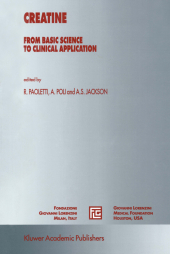 Neuerscheinungen 2012Stand: 2020-01-07 |
Schnellsuche
ISBN/Stichwort/Autor
|
Herderstraße 10
10625 Berlin
Tel.: 030 315 714 16
Fax 030 315 714 14
info@buchspektrum.de |

Ann S. Jackson, Rodolfo Paoletti, A. Poli
(Beteiligte)
Creatine
From Basic Science to Clinical Application
Herausgegeben von Paoletti, Rodolfo; Jackson, Ann S.; Poli, A.
2000. 2012. xi, 120 S. 14 SW-Abb. 240 mm
Verlag/Jahr: SPRINGER NETHERLANDS; GIOVANNI LORENZ; SPRINGER 2012
ISBN: 9401058393 (9401058393)
Neue ISBN: 978-9401058391 (9789401058391)
Preis und Lieferzeit: Bitte klicken
This volume, based on the International Congress Creatine: From Basic Science to Clinical Application , held in Milan on June 4, 1999, outlines the physiological role of creatine in the human body as well as its possible role in different pathological conditions. Creatine is already used as a dietary supplement to augment muscle performance in healthy individuals and inpatients with immobilizing diseases, such as complex fractures. There is also an increasing interest in its administration in a growing number of clinical conditions. A specific deficit of endogenous synthesis of creatine which responds to high dosage exogenous supplementation has been described. In cardiac failure and in chronic obstructive pulmonary disease, creatine improves the contractility of the muscular system. Promising effects of this substance have also been described in animal models of neurodegenerative disorders, such as amyotrophic lateral sclerosis, and in some mitochondrial cytopathies.
This volume is of obvious interest to basic scientists working on the physiology of creatine and to clinicians interested in its medical indications.
Preface. List of Contributors. I: Creatine: Biochemical Aspects. Creatine-Phosphocreatine Pathway in the Intracellular Networks of Energy Transfer and Signal Transduction in Muscle Cells; V. Saks, et al. Guanidinoacetate Methyltransferase (GAMT) Deficiency, the First Inborn Error of Creatine Metabolism; S. Stöckler-Ipsiroglu. II: Physiology and Physiopathology. A Physiological View of The Creatine-Phosphate Shuttle, Exercise, and Protein Synthesis; S.P. Bessman, J. Luo. Creatine in Cardiovascular Metabolism During Physiological and Pathological Conditions: NMR Studies; J.F. Clark. III: Role of Creatine in the Clinical Practice. Effects and Safety of Dietary and Supplementary Creatine; R.C. Harris. Creatine Supplementation in Patients with Chronic Heart Failure; A. Gordon. Creatine in Sports Medicine: Nutritional Supplementation and/or Medicinal Product? G. Benzi. IV: Use of Creatine in Sports Medicine. Physiological Role of Creatine in Muscle Metabolism During Exercise; P. Ruggeri. Impact of Oral Creatine Supplementation on Muscle Performance During Training and Rehabilitation; P. Hespel, et al. Factors Modifying Creatine Accumulation in Human Skeletal Muscle; P.L. Greenhaff. V: Use of Creatine: New Potential Applications. New Areas for Creatine Supplementation: Chronic Obstructive Pulmonary Disease and Geriatric Conditions; G. Enzi. Creatine Supplementation in Mitochondrial Cytopathies; J.M. Bourgeois, M.A. Tarnopolsky. The Neuroprotective Properties of Creatine in Animal Models of Neurodegenerative Diseases; R. Kaddurah-Daouk, et al.


